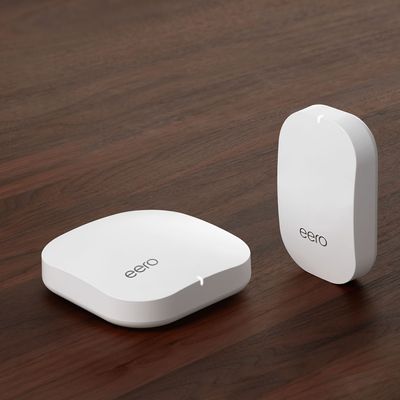
Amazon continued its shopping spree of companies making products for the smart home on Monday, buying mesh W-iFi router Eero. (Mesh networking uses a web of multiple router base stations to ensure that your house is blanketed in a strong and consistently fast Wi-Fi signal.) While Amazon and Eero aren’t disclosing the terms of the deal, during Eero’s series D round of funding, its valuation was pegged at at $215 million on a $40 million raise, a relatively low valuation for a relatively high amount of funding. Eero was also forced to lay off 30 employees at the beginning of 2018, meaning it’s likely that Amazon was able to acquire Eero on good terms.
The acquisition means two things. One, it solidifies Amazon’s growing portfolio of products meant to make the smart home easier to run, from its homegrown Echo products to its acquisition of Ring and camera-maker Blink. While Eero itself isn’t a smart home product per se, it’s hard to have a smart home run without good Wi-Fi.
Secondly, it means that Google and Amazon now control the two biggest mesh Wi-Fi routers on the market. Eero was the first mesh Wi-Fi router to hit the market, and if you don’t mind a price premium, it remains the easiest one to set up and use. On the other hand, Google Wifi is also very, very good and costs just $250 for a three-pack (while a three-pack of Eero routers comes in at $500).
So far that price differential has made Google Wifi the winner in the marketplace; per NPD Group, Google Wifi dominates the mesh Wi-Fi router space. It makes for an interesting push-pull relationship right now, with Amazon still holding a firm (but shrinking) lead in smart speakers but Google controlling the best way to make sure your smart speaker works: Alexa remains very silent if a Wi-Fi signal can’t get to it.
It’ll be interesting to see if Amazon tries to bring the price on Eero down; the company tries to keep margins thin on its products while going for high-volume sales, making Eero’s higher-end play a bit out of sync with the rest of the company.
For Eero owners worried that Amazon will now start sucking up all the info your Wi-Fi router has about you — which, it should be said, is pretty much everything you do online in your home — Eero has said it remains dedicated to keeping user data out of third-party hands even post-acquisition. Of course, post-acquisition, Amazon is now first-party, so Eero owners will want to watch out for any updates to terms of service.
For anyone who doesn’t like the idea of either being under Amazon or Google’s thumb, there are a still a few options. The Netgear Orbi is a high-powered mesh router that’s earned top marks — the Wirecutter named it its top pick — that sells for $350. Luma is your best bargain option; you can find three-packs for just $129.
One company noticeably absent from all of this? Apple, which for nearly 20 years made WiFi routers that were among the easiest to use and highest in quality, especially in the very early days of WiFi. But Apple exited the WiFi router business altogether last April. It was an odd decision at the time, and remains one today — Apple fans still seem willing to pay a bit more to remain in the Apple ecosystem, and Apple’s dedication to privacy would seem like a real selling point compared to Amazon and Google. There’s a slim — very slim — chance that Amazon’s acquisiton of Eero may have Tim Cook and company reconsidering that.





























